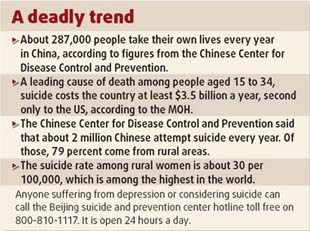There is growing nationwide debate over whether there is sufficient early intervention help available for people contemplating suicide.
According to the Chinese Center for Disease Control and Prevention, some 287,000 people take their own lives every year in China.
The Ministry of Health (MOH) puts the number at 25 out of every 100,000 people.
In addition, the Beijing Suicide Research and Prevention Center has estimated that between 2.5 million and 3.5 million people every year attempt to end their lives.
Among them is a growing number of well-to-do professionals, which sparked the latest round of debate.
Last month, Yu Hong, a 50-year-old doctor and teacher at Renmin University of China, took his life by jumping from a 10-story building in Beijing.
"Giving up life means a kind of courage and self-respect for me, even if it is considered a negative choice," Yu wrote in a blog before his death.
Nie Zhenwei, head of the psychological counseling center at Beijing Normal University, told China Daily yesterday that it was a "misconception" that well-educated people with more wealth and social status were able to better cope with the pressures of everyday life.
"Having strived for wealth and a successful career, some of these people have in turn accumulated a certain amount of mental pressure," he said.
Ashamed of their fragile mental state, many vulnerable people turn to self-harm instead of seeking help, he said.
"People feel they have to follow that path because of the pressure of work, relationships or health issues," Nie said.
Zhang Yanping, vice-chief of the research center at Beijing Huilongguan Hospital said research into the incidence of suicide in China goes back only as far as 2000, making it hard to identify emerging trends.
He told the Guangzhou Daily that China needed to update its research to determine whether the suicide rate is increasing.
People are not getting appropriate treatment for depression and other mental illnesses, he said.
Nie said: "We need more mental health experts and society as a whole should provide more channels for people to deal with psychological crises".
(China Daily January 3, 2008)


